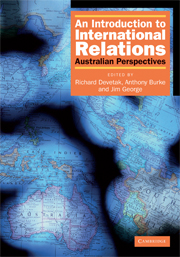Book contents
- Frontmatter
- Contents
- List of tables, figures and boxes
- List of contributors
- Preface and acknowledgments
- An introduction to international relations: the origins and changing agendas of a discipline
- 1 Theory and practice in Australian international relations: the search for identity and security
- Part 1 Theories of international relations
- 2 International relations theory in an era of critical diversity
- 3 Liberalism
- 4 Realism
- 5 Marxism
- 6 Feminism
- 7 Postmodernism
- 8 Constructivism and critical theory
- 9 Global justice and cosmopolitan democracy
- Part 2 The traditional agenda: states, war and law
- Part 3 The new agenda: globalisation and global governance
- Glossary of terms
- Bibliography
- Index
- References
5 - Marxism
from Part 1 - Theories of international relations
- Frontmatter
- Contents
- List of tables, figures and boxes
- List of contributors
- Preface and acknowledgments
- An introduction to international relations: the origins and changing agendas of a discipline
- 1 Theory and practice in Australian international relations: the search for identity and security
- Part 1 Theories of international relations
- 2 International relations theory in an era of critical diversity
- 3 Liberalism
- 4 Realism
- 5 Marxism
- 6 Feminism
- 7 Postmodernism
- 8 Constructivism and critical theory
- 9 Global justice and cosmopolitan democracy
- Part 2 The traditional agenda: states, war and law
- Part 3 The new agenda: globalisation and global governance
- Glossary of terms
- Bibliography
- Index
- References
Summary
Introduction
This chapter reflects on Marxism's contemporary relevance to international relations. First, it reflects on Marxism's exclusion from the traditional study of international relations. Second, it notes Marx's prescience in identifying the globalising tendencies of capitalism. Third, it outlines how Marx and Marxists view the state. Marxism essentially presents an endogenous account of international relations which focuses on the internal economic requirements of capitalist states. This leads, fourth, to an underestimation of nationalism and war in reproducing the state and states-system, and, fifth, to great scepticism towards notions of the ‘national interest’ and ‘free trade’. Finally, the chapter considers the Marxist critique of imperialism.
Marxism's exclusion from international relations
Karl Marx and his analysis of capitalism have been largely absent from the curricula of mainstream International Relations courses in the West, especially before the 1970s (Linklater 1990a). There are three broad reasons for this.
First, in the Western world Marxism was closely associated with communist states such as the USSR, China and Vietnam. It was the self-proclaimed philosophical foundation of the communist world which, by its very political outlook, constituted a threat to Western capitalist states. During the Cold War, Marxism was widely portrayed in Western political capitals as expansionist and messianic because it was routinely equated with the foreign policy of communist states, which were thought to represent a strategic challenge to the West (Kubālkovā and Cruickshank 1989: part II).
- Type
- Chapter
- Information
- An Introduction to International RelationsAustralian Perspectives, pp. 64 - 74Publisher: Cambridge University PressPrint publication year: 2007

